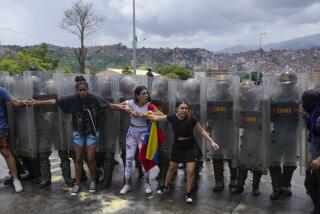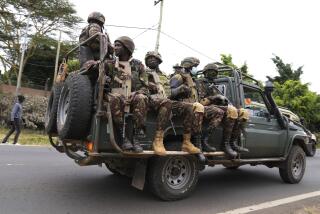125 dead in Kenya’s bitter election violence
- Share via
NAIROBI, KENYA — Police opened fire on rampaging opposition supporters who were burning houses and cars, looting businesses and attacking people Monday as the death toll in Kenya’s post-election violence climbed to at least 125.
In Kibera, a sprawling slum of Nairobi, youths armed with machetes, wooden posts and iron bars tore down shacks and looted whatever was left to take. Similar scenes played out across the country in the third day of riots to protest what the opposition contends is election-rigging.
Police reported 125 people killed, dozens of them in the western town of Kisumu, one of the hardest-hit areas. Witnesses said many were shot by police.
“The police were just firing live bullets. There were two lorries [trucks] going around picking up bodies. I saw 10 bodies and there were more in other areas,” said a 37-year-old Kisumu resident who gave only his surname, Obok. “The fighting is still going on. The situation is very bad.”
“This town is no longer a town,” said another witness, Michael Makangu, 32. Protesters “burned all the buildings they could get.” Amid chaos and allegations of irregularities in the ballot count after Thursday’s election, President Mwai Kibaki was declared the winner over opposition candidate Raila Odinga and was hastily sworn in for another five-year term Sunday.
The Bush administration “urged all parties to call on their supporters to remain calm and respect the rule of law,” Scott Stanzel, a deputy White House press secretary, said Monday in Crawford, Texas, where President Bush was spending the New Year’s holiday.
A statement by the U.S. Embassy expressed concern about the “serious problems” in the count, but deplored the violence. European observers said the election lacked credibility.
The bitter dispute over the vote could undermine Kenya’s democracy, which had been considered one of the most vibrant on the continent.
The opposition’s only recourse is court, but Odinga has scorned the judiciary as Kibaki appointees who will not deliver justice.
If unchecked, the violence and looting also could damage Kenya’s booming economy.
Kenyan voting patterns run along tribal lines, and Thursday’s election was no exception. The Luos and other tribes resent what they see as dominance by Kibaki’s Kikuyu tribe, which is the country’s largest. Election disputes often spill into tribal violence, in this case, opposition Luos beating Kikuyus.
Kisumu journalist James Ochieng, 24, of the Daily Nation newspaper, said he had confirmed at least 40 dead there.
“There have been running battles all day between police and protesters. The mobs are overwhelming the police,” said Ochieng, who, like other residents of the western town, was interviewed by telephone. “The police keep retreating and they run out of ammunition.
“The Kikuyus are being evicted, they’re being beaten. Their property is being robbed. The situation is very volatile.”
Twenty of those beaten in mob violence were treated at a hospital but transferred to a safer location when youths stoned the building, Ochieng said.
Kibaki, 76, who has been in politics since Kenya gained independence from Britain in 1963, called for calm, but threatened tough action against protesters.
“My government will . . . deal decisively with those who breach the peace by intensifying security across the country,” he said. The Associated Press quoted several police officers as saying the force had been given orders to shoot to kill.
In Nairobi, the capital, hundreds of police officers were deployed to prevent the opposition from converging on a city park, blocking Odinga’s plans to hold a ceremony swearing him in as the “people’s president.”
Odinga said he was the elected president. He demanded that Kibaki step down and called for a mass protest Thursday in Nairobi. “For the last 48 hours, the people of Kenya have seen their nascent democracy shackled, strangled and finally killed,” he said.
Businesses in the capital were closed and roadblocks prevented access to downtown. Normally crowded streets were deserted and hotels were nearly empty. Live television broadcasts were banned for a second day.
Markets also were closed. Many Kenyans, most of whom lack refrigerators and must shop daily, were trapped at home without food. Some sought shelter at hotels.
In Kibera, angry youths shouted that the violence against Kikuyus would not end until Odinga was president.
“We are targeting Kikuyus because they are the ones who stole our votes,” shouted one youth. “Raila won, let him take power. Otherwise it will go on like this and they will shoot us, kill us, we don’t care.”
But other Luos were alarmed by how far the violence has gone.
“It’s not a problem of the small people. The problem is caused by the president who did the rigging,” Obok said.
Another Kisumu resident, Edmund Ouko, had to take refuge in a hotel for three days after nearly being attacked by fellow Luos because he was wearing the bright orange clothing of the opposition party. He said traveling the streets remained risky.
“The problem is the vehicle,” he said. “The moment they see it, they want to attack you.”
Dixon is a Times staff writer and Soi a special correspondent. Times staff writer James Gerstenzang in Crawford, Texas, contributed to this report.
More to Read
Sign up for Essential California
The most important California stories and recommendations in your inbox every morning.
You may occasionally receive promotional content from the Los Angeles Times.










